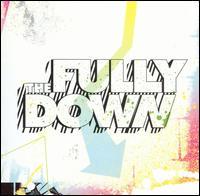
The Fully Down
Don't Get Lost in a Moment (2005)
Jordan Rogowski
Some bands burst into the music world with originality and a fresh take on a genre, immediately making an impact and paving the way for other bands in years to come. The Fully Down is not one of those bands. In fact, almost the exact opposite, only further contributing to the increased homogenization of music.
Wasting no time making Taking Back Sunday lyrics their own ("It's times like these, where silence can mean everything"), the Fully Down bounce into a brand of pop-rock that's all too familiar as of late. Multi-part harmonies, "clever" lyrics and song titles and basic instrumentation, it's just another chapter in a book first written long ago, and they match previous stories word for word.
Let's address the basic defense of this kind of band before we go any further. "It's catchy." We know, so are the crabs in Paris Hilton's pants, and I don't see anyone defending those. It's not enough anymore for something to catch your ear with melody, as any band can offer that much, there's simply got to be something beyond that to keep people coming back for repeated listens. Therein lies the problem with Get Lost in a Movement; one listen will offer you all you'll ever need to hear of the band, because next week, another band is going to release the exact same record to the exact same type of kids. It's only going to go away when people stop buying it, and right now, that's simply not happening. Apparently nobody requires any more of music they listen to than to have song titles like "Go to Heaven for the Climate, Hell for the Company." No, really guys, that's funny. Especially since you're the first to do it. Here's to being trendsetters!
The fact is the music is just as much a retread as the long song titles they employ. There's the more upbeat, bouncy pop-rock tracks, and the somewhat low tempo affairs which are supposed to be a departure, but ultimately fail. I'll give it to the band, they know how to write a harmony; the problem is that same harmony appears on every single song, so no matter how good it is the first time, you're sick of it by the twelfth. The one bright patch here is that some of the guitar work does deviate from standard three-chord fare, but as in the middle of "Plug in the Eliminator," but it seems to be more an attempt to diversify their sound for the sake of it than actually implement those solos in a way that would make sense.
It's good on the initial run though, but if you're going to push it any farther than that, you'd better be aware that the trails run thin.